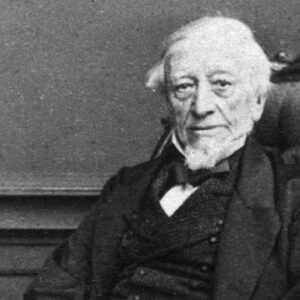Peter Mark Roget was an English physician, philologist, and inventor most remembered for his 1852 publication of ‘Roget’s Thesaurus of English Words and Phrases,’ a categorized collection of related words. Roget was born in England to a Swiss clergyman and graduated in medicine from Edinburgh University. He published articles on tuberculosis and the effects of nitrous oxide, which was then employed as an anesthetic, as a young physician. He began his career in Bristol and Manchester and later relocated to London, where he continued to teach medical matters. Later, Roget constructed a slide rule for calculating the roots and powers of numbers, which served as the foundation for slide rules that were used in schools and universities until the calculator was invented. He was also fascinated by optics and authored a paper proposing ways to improve the kaleidoscope. Along with it, he produced studies on a variety of subjects, including natural theology and phenology, and contributed to various nineteenth-century encyclopedias. He spent the remainder of his life working on the project for which he is most famous today, ‘Roget’s Thesaurus of English Words and Phrases,’ a dictionary of synonyms. He was a fellow of the Royal Society and served as its Secretary for over two decades, and his amazing Thesaurus has never been out of print since it was first published.
Childhood & Adolescence
Peter Mark Roget was born in Soho, London, England, on January 18, 1779, to Swiss clergyman Jean Roget and his wife, Catherine Romilly. He was the younger brother of a younger sister.
When Peter was a child, his father died. This had a profound effect on him. He battled depression for the majority of his life. By the age of eight, he had developed a strong affinity for list-making as a coping method.
After graduating from high school, Roget enrolled in the University of Edinburgh to study medicine, graduating in 1798.
Peter Mark’s Career
He practiced medicine in London from 1808 to 1840 and also became an inventor, natural theologian, and lexicographer during his illustrious career.
He devised the ‘log-log’ slide rule for computing the roots and powers of numbers in 1814. It aided in doing exponential and root calculations and was particularly effective for fractional powers and roots calculations.
Later in life, he took an interest in optics, and in December 1824, he gave a paper titled ‘Explanation of an optical illusion in the appearance of a wheel’s spokes when viewed via vertical apertures’.
In 1834, he was appointed the Royal Institution’s first Fullerian Professor of Physiology. Later in life, he was instrumental in establishing the University of London in 1836, where he worked as a physiology examiner.
He also wrote numerous essays on physiology and health, including the sixth ‘Bridgewater Treatise’, ‘Animal and Vegetable Physiology Considered in Relation to Natural Theology’ (1834), and pieces for multiple editions of the ‘Encyclopedia Britannica’.
He co-founded the ‘Society for the Diffusion of Useful Knowledge’ and contributed a number of popular guides to the organization. Additionally, he showed extraordinary ability in generating and solving chess issues and invented a cheap pocket chessboard.
Roget was one of the original 26 founders of the Medical and Surgical Society of London, which was renamed the Royal Society of Medicine in 1805. He was the Royal Society’s Secretary for more than two decades.
Peter Mark Roget stepped down from professional activity in 1840 and eventually resigned as Secretary of the Royal Society in 1848. Following that, he began preparations for the publication of the work for which he is best renowned today.
After retirement, he devoted himself to constructing a dictionary of synonyms based on notes he had taken throughout his career. This was the collection of words classified according to their meanings, which had been compiled as a hobby since 1805.
In 1852, he produced the first printed edition of his philological work, titled ‘Thesaurus of English Words and Phrases Classified and Arranged to Aid in the Expression of Ideas and Literary Composition’.
It was printed twenty-eight times during Roget’s lifetime, and after his death, it was edited and expanded by his son, John Roget, and afterward by John’s son, Samuel Romilly Roget.
His Significant Works
Peter Mark Roget is most known for his 1852 work, ‘Thesaurus of English Words and Phrases,’ a detailed classification of synonyms and verbal equivalents that is still in print in recent editions.
Among his notable contributions is the invention of the ‘log-log’ slide rule in 1814, which is used to calculate number roots and squares. Until the development of the calculator, the rule was the usual way of computation.
Awards and Accomplishments
Peter Mark Roget was the Royal Society’s Secretary from 1827 to 1848.
Personal History and Legacies
Roget was married to Mary Taylor and the couple had two children: John, a son, and Catherine, a daughter. He never remarried after his wife died in 1833.
Peter Mark Roget died in West Malvern, Worcestershire, England, on September 12, 1869, at the age of 90. He is interred at the St James’s Church cemetery.
Estimated Net Worth
Unknown.


